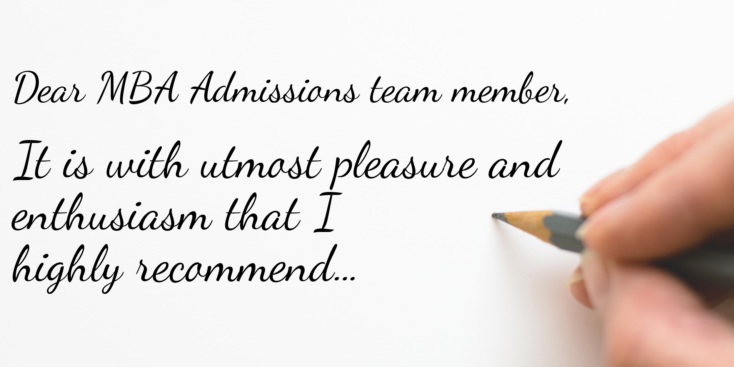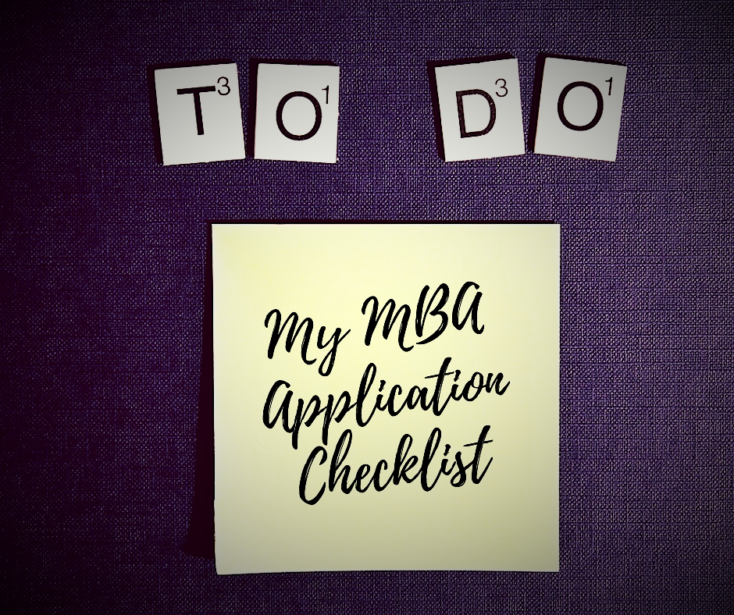Events & Promotions
| Last visit was: 25 Apr 2024, 10:22 |
It is currently 25 Apr 2024, 10:22 |

Customized
for You
Track
Your Progress
Practice
Pays
10:00 AM EDT
-10:30 AM EDT
10:00 AM PDT
-11:00 AM PDT
02:00 PM EDT
-03:00 PM EDT
03:00 PM PDT
-04:00 PM PDT
07:00 PM PDT
-08:00 PM PDT
08:00 AM EDT
-09:00 AM EDT
10:00 AM PDT
-12:00 PM PDT
| FROM Stacy Blackman Consulting Blog: MBA Programs with the Highest Return on Investment |
|
Assessing potential return on investment helps candidates determine whether pursuing an MBA degree makes sense both professionally and financially. After all, business school isn’t cheap. Based on the QS 2019 Global MBA Ranking, this ROI comparison published in Business Insider looks at post-MBA salaries to pre-MBA salaries while factoring in tuition and cost of living. While some overlap exists between the top ten overall in the QS ranking, you’ll see some surprising MBA programs that deliver more bang for your buck. Top MBA Programs for Return on Investment First Place—Manheimm Business School, Mannheim, Germany QS return-on-investment score: 98.3 Tuition: $40K to $49K Post-graduation salary: $100K to $109K Post-program salary growth: 162% 2. IE Business School, Madrid, Spain QS return-on-investment score: 96.8 Tuition: $80K to $89K Post-graduation salary: $90K to $99K Post-program salary growth: 94% 3. SDA Bocconi, Milan, Italy QS return-on-investment score: 96.6 Tuition: $60K to $69K Post-graduation salary: $100K to $109K Post-program salary growth: 116% 4. Strathclyde, Glasgow, UK QS return-on-investment score: 96.0 Tuition: $40K to $49K Post-graduation salary: $70K to $89K Post-program salary growth: 184% 5. Ross School of Business, Ann Arbor, Michigan (tie) QS return-on-investment score: 95.7 Tuition: $110K to $149K Post-graduation salary: $120K to $129K Post-program salary growth: 100% 5. CMU Tepper School of Business, Pittsburgh, Pennsylvania (tie) QS return-on-investment score: 95.7 Tuition: $100K to $149K Post-graduation salary: $110K to $119K Post-program salary growth: 113% 7. Imperial College London, UK QS return-on-investment score: 95.0 Tuition: $60K to $69K Post-graduation salary: $70K to $89K Post-program salary growth: 29% 8. University of Hong Kong QS return-on-investment score: 94.6 Tuition: $70K to $79K Post-graduation salary: $90K to $99K Post-program salary growth: 108% 9. Cranfield School of Management, Cranfield, UK (tie) QS return-on-investment score: 94.5 Tuition: $40K to $49K Post-graduation salary: $90K to $99K Post-program salary growth: 124% 9. Durham University, Durham, UK (tie) QS return-on-investment score: 94.5 Tuition: $30K to $39K Post-graduation salary: $70K to $89K Post-program salary growth: 87% (source: Business Insider) Keep This in Mind When Considering ROI Students of two-year MBA programs typically have the largest investment expense because they miss two years of employment. They need to recoup the cost of the MBA degree plus the opportunity cost in order to get a positive return on their investment. Prospective students should consider payback time with projected cumulative growth, and average growth rate, when looking at return on investment as a motivating factor for pursuing an MBA. But keep in mind, the value of the MBA degree varies depending on your post-graduation plans, as well as the brand of the business school where you earn the degree. Remember, every choice that you make when deciding whether an MBA makes sense for you– ranging from the cost of the city you decide to live in, the field you move into, to the school you choose – will impact your financial return on investment. Nevertheless, no other degree can open doors as the MBA does. The post MBA Programs with the Highest Return on Investment appeared first on Stacy Blackman Consulting - MBA Admissions Consulting. |
| FROM Stacy Blackman Consulting Blog: MBA Admissions Advice from Yale SOM Students |
 Last week, Yale School of Management posted timely MBA admissions advice straight from current first-year students, AKA Admissions Ambassadors. Whether you have your sights on Yale SOM for Round 2, or find yourself in the intel gathering stage, their admissions advice can guide your journey to b-school. Take at look at these three focus areas and learn why each is so important. Understand School Culture, Fit A visit to campus will provide the most complete understanding of a particular b-school’s culture, and your fit with said culture. If such a trip proves too difficult prior to applying, find an off-campus event near you. Talking to a variety of current students and alumni will offer a clearer idea of whether or not you click. “This will allow you to evaluate if a school is truly the right fit for you and, more important, it will help you in the application process to show your enthusiasm for the school and speak about how you plan to make the most of your time at the school in the interview,” says Jvaneel Parekh. Additionally, do your research of the strength of the alumni network. Consider class size and teaching methodologies. Also, find out how diverse is the school. “I think it is really important to be honest with yourself and know what you want to achieve out of business school, says Paraj Tyle. “That not only helps find a good match in terms of opportunities, but also the right culture. The right culture fit is so important in having a phenomenal experience.” Why Business School? Are you seeking an MBA for career advancement, personal development, or a career switch? Indeed, your MBA could transform everything about your life. However, it’s more typically a tool to polish existing skills, build your network or expose you to new industries. “Take the time to really think through your story: Why do you want to go to business school? Why is a particular school the right fit? Why is all of this essential to your career goals?,” advises Lauren Motzkin. “This reflection will help in making a really big decision and will also help you to craft an authentic and consistent narrative for your application.” Our best admissions advice? Clearly detail what you still need to learn, and what experience you must gain, in order to reach your career goals. Don’t be afraid to point out what gaps you have and exactly how an MBA can help. Express Your True Self It may sound obvious, but one of the real keys to a successful MBA application is simply being authentic. Don’t shy away from your true interests; illustrate how they have helped shape the incredibly dynamic and fascinating person that you are. The trick to fleshing out your human side in the application is to take just a couple of experiences, activities, or themes and expand upon them in a much more detailed and nuanced way. Most MBA applicants aren’t professional writers, and sometimes make the mistake of writing essays that are informative, logical, well-organized and, inadvertently, a snooze fest. This is not the time to repeat your resume in prose form. You must connect with the person evaluating your application on an emotional level if you hope to stand out. “Be vulnerable. Sometimes it will seem awkward or uncomfortable, but tell your true story, show who you are, and be open about it. Be bold enough to let your inner self shine in your application, but be even bolder by letting the school know that you’re not perfect, that you have space for growth, and that you have dreams and ambitions to reach—and it’s because of those ambitions that you want an MBA at that particular school,” counsels Lucas Silva. The admissions committee wants to get to know you as a person beyond the resume. Never write anything just because it seems like something an admissions committee would want to hear. That move is almost guaranteed to backfire on you. Looking for more MBA admissions advice? Meet the Yale School of Management Admissions Ambassadors who shared their thoughts with prospective students here. The post MBA Admissions Advice from Yale SOM Students appeared first on Stacy Blackman Consulting - MBA Admissions Consulting. |
| FROM Stacy Blackman Consulting Blog: MBA Essay Advice for Entrepreneurs |
 Business schools have always prepared students to launch and manage their own businesses. But over the last decade, the number of courses, centers and contests dedicated exclusively to entrepreneurship has mushroomed. When it comes to the MBA application, though, many entrepreneurs feel unsure of the best way to convey their unconventional background. If that sounds familiar, check out this MBA essay advice for entrepreneurs recently shared by Mark Skoskiewicz in Business Because. Skoskiewicz received his MBA from Kellogg School of Management, and is the founder of test prep company MyGuru. He thinks applicants should focus on including four specific things in their applications. Show How B-School will Fill in the Gaps Many entrepreneurs have failed at getting their business idea off the ground because they didn’t have the tools in their arsenal that they would have learned at business school. B-school has become the safe place to test out your most creative, outrageous and ambitious ideas without the pressure and fear of failure. It also offers students the chance to refine their business models to nail it next time out in the real world, when the stakes are much higher. “Your admissions essays should demonstrate that you see the value of building a well-rounded intellectual toolkit to help you build your business,” Skoskiewicz writes. “If there are clearly particular skills or concepts you know you’ll need but which your background lacks, highlighting these specific gaps will create a powerful story.” Convince the Adcom of Your Thirst for Experiential Learning These days, top business schools place a lot of emphasis on experiential learning. This hands-on approach to learning undoubtedly benefits those with an entrepreneurial spirit. It also aids generalists who enjoy working in groups and want to learn how to get things done. Unlike the lecture and case method approach, experiential learning encourages students to learn by doing. “Most MBA programs encourage this type of learning, and you’ll be well served to highlight your interest in learning in this way as part of your rationale for wanting to get an MBA,” he advises. Don’t Get Bogged Down With One Very Specific Entrepreneurial Idea “Business school can be a powerful platform for articulating ideas to others and getting feedback. So, I think talking about the actual ideas you have and about how you’ll test them in school is a great strategy. But spending too much time talking about a specific idea becomes dangerous,” Skoskiewicz counsels. “Admissions committees are interested in understanding how an MBA fits into your career plans and what you’ll bring to the community. You shouldn’t waste too much time describing details of specific ideas. This takes space away from describing the ways in which MBA school will help you pursue the idea,” he adds. An SBC Client Case Study When Miles came to work with SBC, he had already gone through two admissions cycles with nothing but dings. His prior applications had completely left out his entrepreneurial venture because he did not feel comfortable describing a business that brought in just a couple thousand dollars a month. While his venture had not grown significantly, it was a legitimate company with employees, partners, customers, a website and more. In fact, in launching and developing his business, Miles showed a lot of initiative, focus, creativity, vision and drive. He told a great story about how his interest in the business developed. He also discussed many of the challenges he had encountered and overcome along the way. While the business was growing slowly, it was growing, and he was learning a ton. Ultimately, the fact that he still needed business training was clear through his story and tied very nicely with why he needed an MBA. His new application presented a very focused picture of an unconventional person quite ready for business school. Miles had a lot to learn from and contribute to an MBA program. Show You Can be a Team Player Entrepreneurial success requires teamwork and strong business relationships. Your network of classmates can advise on various areas. Plus, seasoned professors can weigh in on business dilemmas as you build a plan. In fact, good relationships with your professors can translate into a lifelong pipeline of talent connecting graduates with current MBA students. “Business school is certainly a good place to network with people who share an interest in building companies,” says Skoskiewicz. “Talking about networking and team-building as a rationale for wanting to pursue entrepreneurship while in an MBA program makes sense.” So heed this MBA essay advice for entrepreneurs. If you do, you’ll stand a good chance of persuading the admissions committee to take a closer look at you. You can read more of Skoskiewicz’s MBA essay advice for entrepreneurs here. The post MBA Essay Advice for Entrepreneurs appeared first on Stacy Blackman Consulting - MBA Admissions Consulting. |
| FROM Stacy Blackman Consulting Blog: Economist Crowns Chicago Booth 2018’s Best MBA Program |
 This week, The Economist has published its annual ranking of the world’s best MBA programs, and the University of Chicago Booth School of Business once again takes the top spot for 2018. This is the sixth time in seven years Booth has reigned supreme in this ranking, ending rival Kellogg School of Management‘s moment in the limelight last year. Even though Booth has a reputation for finance and “super quants,” The Economist deems it a well-rounded MBA program. Most noteworthy, graduates gush about finding employment in a wide range of industries, and students consider Chicago Booth career services top-notch. “They also praise its world-class facilities and faculty, which includes several Nobel laureates. Job opportunities are among the best, thanks to a highly rated careers service and an alumni network of 52,500 people, one of the largest in the world. Employment outcomes are outstanding: 97% of students find a job within three months of graduation. Graduates pocket an average salary of $129,400, a 67% rise on their pre-mba pay cheques. The relationship with alumni lasts beyond graduation. The school runs refresher courses for former students on subjects such as entrepreneurship,” The Economist noted. The Economist’s Top Ten Best MBA Programs
Looking at an initial selection of 100 leading business schools around the world, the ranking criteria The Economist uses is based on how well the program opens new career opportunities (35%), one’s personal development/education experience (35%), increase in salary (20%), and the potential to network (10%). The Economist used two surveys in spring 2018 to collect the data for this ranking. The first, completed by schools with eligible programs, covers quantitative matters and accounts for 80% of the ranking. This included salary of graduates, average GMAT scores, and the number of registered alumni. The remaining 20% comes from a qualitative survey filled out by current MBA students and a school’s most recent graduating MBA class. Critiques of the Ranking Interestingly, business school news portal Poets & Quants expressed some reservations about the reliability of these rankings. “As is often the case in the British magazine’s rather unpredictable and often nonsensical ranking, there are some real shocks,” editor John A. Byrne observed. Outside of the top five programs, whose positions were stable and consistent with previous years, “wild ups and downs” characterize much of the list. “Of all the major rankings, The Economist’s ranking often is the most volatile list. This year proved no exception to that rule,” he added. ” It’s not possible, after all, for an MBA program to change all that much in a single year. In fact, it’s rare for a business school’s quality to change dramatically over a five-year timeframe.” You can see the full Economist ranking of the best MBA programs here, and do check out the P&Q analysis linked above for a deeper dive on the subject. The post Economist Crowns Chicago Booth 2018’s Best MBA Program appeared first on Stacy Blackman Consulting - MBA Admissions Consulting. |
| FROM Stacy Blackman Consulting Blog: Addressing MBA Admissions Myths at Michigan Ross |
 The University of Michigan’s Ross School of Business is an academic powerhouse no matter which way you slice it. Last week, in The Economist‘s 2018 ranking of best MBA programs, Ross jumped five spots over last year to land at number seven. Such excellence invariably sparks a fair amount of confusion and assumptions when it comes to applying. Thankfully, admissions director Soojin Kwon is here to clarify–or dispel—the most persistent MBA admissions myths surrounding the process at the Ross School. Myth # 1 Ross admits more applicants in round one than in round 2. True, Kwon acknowledges, though she says that can be interpreted in the following ways:
Myth # 2 Your GMAT score must be above 720 to get a scholarship. False, the admissions director assures, noting that this year’s scholarship recipients had GMAT scores ranging from 620 to 770. “We care also about your full-time work experience, your recruitability, the uniqueness of the perspective you’ll bring to the class, and your potential to engage in and lead the community,” says Kwon. Myth # 3 Scholarship opportunities shrink in Round 2. False, Kwon declares. At the Ross School, the scholarship budget isn’t split up by round. “We award based on an applicant’s potential to contribute to the class in myriad ways,” she explains, adding that, “In some years, we spend more in Round 1; in other years, we spend more in Round 2. In the last two years, more than 40% of our students received a scholarship, ranging from $10K (annually) to full tuition.” Soojin Kwon’s Note for Round 2 Applicants Now that you’ve got a clearer picture of the MBA admissions myths at Ross, it’s time to look ahead to Round 2. The Ross admissions team will be hitting the road again in early November, including a stop in New Delhi after Diwali. Also, check out Ross’s many webinars that deep-dive into the school’s resources for different career paths. All webinars include the voices and insights of our students, says Kwon. “We encourage you to go beyond school websites and meeting the AdCom; connect with current students at every school on your list. They’re the ones who can give you deeper insight into the experience at their school.” The post Addressing MBA Admissions Myths at Michigan Ross appeared first on Stacy Blackman Consulting - MBA Admissions Consulting. |
| FROM Stacy Blackman Consulting Blog: $25M Gift to Enhance Entrepreneurship at Wharton |
 The Wharton School’s More Than Ever fundraising campaign has received a significant boost thanks to a $25 million gift from Wharton School alumnus Nicolai Tangen and his wife Katja Tangen. The gift supports entrepreneurship and will spearhead construction of a new campus building—Tangen Hall—plus establish an international scholarship fund. Tangen Hall represents the first-ever dedicated space for cross-campus student entrepreneurship at the University of Pennsylvania. “Talented and creative students are working hard to identify challenges where they can implement efficient, sustainable, and actionable solutions through innovative ventures,” says Penn President Amy Gutmann in a statement announcing the gift. Additionally, a new Katja and Nicolai Tangen International Endowed Scholarship will provide financial aid to international undergraduate students facing prohibitive economic challenges. “Katja and Nicolai Tangen’s immense impact will be felt for decades to come,” says Wharton Dean Geoffrey Garrett. A New Home for Entrepreneurship at Wharton Penn Wharton Entrepreneurship and other student entrepreneurship programs across the university will come together within Venture Lab at Tangen Hall. “Tangen Hall marks a new chapter for the entrepreneurial community at Penn and in Philadelphia, providing a central hub for the groundbreaking innovations that happen here every day,” says Wharton Vice Dean of Entrepreneurship and Innovation Karl Ulrich. “This physical space will allow faculty to more strongly support students who turn ideas into outcomes that will transform business for years to come.” Plans for the building include:
Undoubtedly, the Venture Lab will enhance faculty involvement in entrepreneurship across the university. Penn has more than 55 standing faculty in a wide range of disciplines with a demonstrated interest in entrepreneurship. Furthermore, 15 members of the standing faculty at Wharton primarily focus their teaching and research in this area. In the end, Dean Garrett believes Tangen Hall will energize the entire campus community. In fact, he calls it a “game-changing facility for innovation, entrepreneurship, and technology.” Meanwhile, Mr. Tangen says, “We look forward to their many achievements in the years ahead, and to witnessing how this new building will bring together the next generation of entrepreneurs, leaders, and innovators to share their talents with one another and for the greater good.” Construction of Tangen Hall will begin in 2019 and should finish by 2020. You can learn more about entrepreneurship and innovation at Wharton here. The post $25M Gift to Enhance Entrepreneurship at Wharton appeared first on Stacy Blackman Consulting - MBA Admissions Consulting. |
| FROM Stacy Blackman Consulting Blog: Stanford GSB Enacts New Financial Aid System |
 Following last winter’s scandal surrounding the financial aid award practices at Stanford’s Graduate School of Business, the school has revamped its policies and will now base scholarships solely on economic needs. Uproar ensued when a data breach revealed glaring discrepancies in scholarship awards. While the school had claimed it didn’t give merit scholarships, an MBA student who analyzed 10-year’s worth of data came to a very different conclusion. Per the Wall Street Journal, his report showed that, “Students with nearly identical financial situations often receive ‘vastly different’ awards and that, on average, women received more aid than men and domestic students were favored over international ones.” What does the new financial aid system look like? Earlier this week, Dean Jon Levin laid out the updated system, which will go into effect this December. From now on, the school will award Stanford GSB fellowships based solely on financial need. In addition, all financial aid offers will incorporate a minimum loan. Levin said the financial aid office would determine the size of the loan on an annual basis. “This approach will apply for the general Stanford GSB fellowship pool, which constitutes roughly 85% of our fellowship budget,” he added. New guiding principles for financial aid:
The GSB will also make several improvements to the financial aid application process. “We heard repeatedly that applying for aid was cumbersome, complicated, and frustrating,” Levin acknowledged. A new design is in the works and the school expects it to be an immediate improvement that can be refined over time. Sometimes, exceptional circumstances will come up, Levin wrote, when students have complex situations, such as family health issues. He called these “edge cases,” and said the school hopes to work with students to make sure their calculated need accurately reflects their situation. Additional specifics of the new financial aid system will be available for MBA applicants in December. For more on this issue, see Dean Levin’s note to the GSB community. The post Stanford GSB Enacts New Financial Aid System appeared first on Stacy Blackman Consulting - MBA Admissions Consulting. |
| FROM Stacy Blackman Consulting Blog: What Makes a Great MBA Recommendation Letter |
 The recommendation letter forms an integral part of your MBA application package and can make—or break—your chances of admission. Most schools request two letters of support, and one should come from a supervisor if possible. Your second letter can come from a professional contact who can speak to your strengths and weaknesses, such as a past supervisor or client. Ideally, the MBA recommendation letter provides the admissions committee with a fresh perspective on your skill sets. Above all, your recommenders should enhance your application by offering new and valuable insights into you as a person. That’s why it’s so important to choose people who have worked closely with you and can provide specific and relevant examples of your work. Instead of submitting two highly duplicative recommendations, it’s more powerful to have recommenders who can share some different perspectives on your candidacy. As we recently shared with Find MBA, applicants unwittingly sabotage their efforts when they select bigwig recommenders with impressive titles, hoping to impress the adcomm. This tactic almost always backfires. A person with a fancy title who doesn’t know the applicant won’t be able to offer specific examples and anecdotes to support even the most generous platitudes. In fact, the most effective endorsements come from people who can highlight your professional, personal and interpersonal skills. In addition, you should pick recommenders who will champion your qualities of leadership, analytical ability, communication skills, and integrity. These are traits MBA admissions committees want to see in applicants. A Winning Recommendation Letter Requires Guidance Consider providing your recommender with a packet of materials to help him/her have a better idea of why business school is the next step for you. This could include an updated resume, your application essay responses, and information about the program you hope to attend. In today’s busy world, where everyone is multi-tasking and over-scheduled, it’s not uncommon for a recommender to suggest that you write your own letter. Do not ever do this! If they don’t have time to write a proper recommendation, find someone who is more enthusiastic about championing your business school dreams. Besides being unethical, your application reviewer can usually recognize your writing style from your essays. This is a massive red flag about your integrity and will likely lead to an automatic ding. That said, you can still play a large role in positively influencing the final product. What Should a Recommendation Letter Emphasize? Sit down with each recommender and let them know the key attributes you’d like them to include. This could mean emphasizing your charisma, intelligence, determination, or creative thinking. Next, make your recommender’s life easier by providing them with at least one concrete example to illustrate each characteristic. Sharing details of how you contributed to projects, or giving specific examples of how you interact with others, or went above and beyond — these are the things that make for a great recommendation letter. Most schools ask recommenders about your weaknesses or areas of development. Make your self-awareness a strength. Give the recommender a growth area for you as well as examples of how you are working on it. A recent performance evaluation is a good place to start. Also, address how getting your MBA will help you further develop in this area. Then the recommender can speak to your maturity and awareness. This shows schools you intend to hit the ground running and improve through their program. The goal of managing your recommenders is to make it as easy as possible for them to write glowing letters. That’s why a recommender package is a win-win for all. Your recommenders will appreciate your assistance and thoroughness, and produce a better recommendation on your behalf. The post What Makes a Great MBA Recommendation Letter appeared first on Stacy Blackman Consulting - MBA Admissions Consulting. |
| FROM Stacy Blackman Consulting Blog: 4 Research Tips for Veteran MBA Applicants |
 In honor of Veterans Day, we are re-posting a story with advice for veteran MBA applicants transitioning from the military to business school. Some veterans don’t immediately see the correlation between their skills and experiences from the military and those needed to lead a Fortune 500 company. However, business schools admire the leadership skills, grit and mental agility veteran MBA applicants typically possess. A Washington Post editorial by Harvard Business School Dean Nitin Nohria once argued that MBA programs should target more veterans. “Business school can be a pathway for integrating our service members back into civilian life, and for finding new ways to engage their intellect, integrity and leadership at home,” Nohria explained. Are you planning to transition from active military service to business school? Then begin your research by finding out how each of the programs measures up in the following areas. 1. Explore culture and fit Every applicant should consider whether the business schools that interest them are good fits as far as class size, teaching method, location and general culture are concerned. However, a good fit is even more important for veteran MBA applicants. Their background is quite different from most candidates, and going from active service to a classroom can be challenging. Having strong outlets of support from the school makes a world of difference. Once on campus, find out how many students are in the MBA program. Veterans at top-tier business schools typically make up about 5 percent of each incoming class. Too few fellow service men and women may leave students wishing for more peers they can relate to. Find out what kinds of special programs for veterans exist. Does the business school have student clubs or organizations created specifically for veterans? Also, find out whether it offers personalized academic and career support to help veterans translate their military skills into civilian life. Reach out to current students for their honest feedback about daily life in the program. Listen for details that go beyond what you discover on the school website or by chatting with admissions officers. 2. Consider recruiting efforts and admissions guidance Another sign of a military-friendly school is whether it hosts MBA admissions events or offers targeted application advice for veterans. Even if the school doesn’t host an admissions event specifically for military applicants, you can still get a fair assessment of how eager the program is to recruit veterans by looking at whether it provides support services starting during the application phase – not only once you’re admitted. Examples include the Veteran’s Visit Day event at MIT Sloan School of Management. Also, check out the admissions FAQs provided by the Tuck Veterans Club at Tuck School of Business. Or take advantage of the application and mentorship provided by Wharton’s Veterans Club at the University of Pennsylvania’s Wharton School. Finally, find out if the school offers deferment flexibility to candidates whose needs may change at the last minute if still on active duty. 3. Look into financial aid The high cost of business school often deters veteran applicants. Many already have families of their own, and the concern over lost wages while they study cannot be overstated. However, many financial incentives exist specifically for this group. Your actual out-of-pocket expense goes down dramatically once you factor in Veterans Affairs benefits, dedicated veterans scholarships, waived application fees and the Yellow Ribbon Program. Under this program, the federal government matches, dollar for dollar, any financial aid that participating schools commit, essentially providing eligible student veterans with free or reduced-cost tuition. It’s designed to make out-of-state public colleges, private institutions and graduate programs more affordable for veterans. Schools offer varying levels of support under the Yellow Ribbon Program. Visit the U.S. Department of Veterans Affairs website to learn whether the business school has limits on the number of recipients eligible annually – some are unlimited – and to see the exact dollar amount of the maximum school contribution per student, per year. 4. Check out this book for veteran MBA applicants Veteran applicants need advice targeted toward their specific needs and strengths. Earlier this year, Matthew Cowsert, a U.S. Army veteran and MBA graduate from NYU Stern School of Business, published a book called What’s Next? A Military Veteran’s Guide to Maximizing Your MBA. Cowsert believes this book will help military veterans naturally differentiate themselves from other MBA applicants in order to gain acceptance to their target program and land their dream job. Applicants from the military should know that business school admissions teams highly value their experience, so if that’s your background, make sure your applications highlight those powerful and unique qualities. A version of this post originally appeared on Stacy’s “Strictly Business” MBA Blog on U.S.News.com The post 4 Research Tips for Veteran MBA Applicants appeared first on Stacy Blackman Consulting - MBA Admissions Consulting. |
| FROM Stacy Blackman Consulting Blog: Bloomberg Businessweek’s 2018 Ranking of Best Business Schools |
|
Bloomberg Businessweek recently announced its 2018 ranking of the best business schools in the United States. This year, Harvard Business School got bumped out of the top spot, making room for Stanford Graduate School of Business to take first place. It’s also the first time in 30 years the Stanford GSB has come in first on a Bloomberg Businessweek ranking. A full global ranking will come out on December 11. Top Ten Best Business Schools in the U.S. (2017 ranking in parenthesis)
Bloomberg Businessweek introduced a new, stakeholder-centered methodology for these rankings. This year, the magazine sought to answer three main questions.
To begin, the researchers went deep and wide for this survey of the best business schools. They polled 10,473 students, 15,050 alumni, and 3,698 employers who recruit at b-schools. Using survey results in addition to job-placement and compensation data from the schools, Bloomberg Businessweek created four indexes. These are weighted as follows: Compensation (38.5%), Networking (27.9%), Learning (23.1%), and Entrepreneurship (10.5%). “These new indexes are the building blocks for our 2018 overall ranking,” the news magazine says. You can learn more about the significant changes to its rankings methodology on the Bloomberg Businessweek website. Not Everyone is a Fan As to be expected, Poets & Quants has some sharp observations about the reliability and validity of this new method. Editor John A Byrne gives the magazine credit for trying to do something novel with the creation of these four indexes. However, he also finds this foundation shaky at best. “The magazine’s editors would have you believe that the best three MBA programs [for] learning are at William & Mary, the University of Utah and the University of Texas at Dallas,” Byrnes writes. “We have no beef with the excellence of those MBA programs, but is there anyone in the world, outside of those schools’ stakeholders, who would agree that these programs provide better MBA learning than Harvard, Stanford, Wharton and the rest of the so-called Magnificent 7? We don’t think so.” Our View on Rankings While rankings can inform your decision of where to apply, applicants would do well to focus more on a program’s culture, size, or the strength of its alumni network. When Stacy Blackman Consulting last surveyed business school applicants to find out what matters most to today’s applicants and why, fewer than 12 percent of survey respondents considered culture a top priority. A mere handful considered program content the most important factor influencing the decision to attend a particular business school. These troubling results indicate people aren’t paying enough attention to the program that’s truly a good fit for them. We’re realists and know those headed for b-school really can’t help themselves. But, keep in the back of your mind that placing too heavy an emphasis on rankings can actually become a distraction. Take multiple factors into consideration when making your final school selection. The post Bloomberg Businessweek’s 2018 Ranking of Best Business Schools appeared first on Stacy Blackman Consulting - MBA Admissions Consulting. |
| FROM Stacy Blackman Consulting Blog: Duke Fuqua’s Dean Wants to Recruit ‘Triple Threat’ MBA Applicants |
 What kind of MBA applicant is Duke University’s Fuqua School of Business looking for? Business Insider‘s interview with Dean Bill Boulding reveals that the admissions team seeks candidates with “triple threat capability leadership.” Boulding explains that the magic formula is IQ+EQ+DQ. At Fuqua, that last one stands for decency quotient. So, how does Boulder define each element? Here’s how he explained the triple threat to Business Insider: IQ—Raw Intelligence Dean Boulder: “The truth is that you can’t be stupid if you’re going to be an effective leader. People may follow you once, but they’re not going to follow you twice if you don’t have the ability to really bring to bear your insight on the complexities that any business or any organization faces.” EQ—Emotional Intelligence Dean Boulder: “If you’re going to be working with other people, you have to be able to be sensitive to their emotions, their emotional state, and how they’re feeling. You have to be able to regulate your own emotions and be able to connect with one another in order to rally together and accomplish something extraordinary together.” Certainly EQ is not a new concept, though it has gained greater attention in recent years for its leadership benefits. This article in Forbes, Why Emotional Intelligence is Indispensable for Leaders, calls EQ crucial to leadership success and in being able to relate to others. The ability to put yourself in someone else’s shoes can help you choose the best problem-solving method to achieve your goals. While intelligence is important, emotional intelligence is a key to success in leadership and relating to others. When dealing with others, truly try to place yourself in their situation. It will help you choose the best method to solve problems and achieve your goals. DQ—Decency Quotient Decency, meanwhile, is a trait that just makes you more pleasant to be around. DQ shows that “you’re interested in other people; you’re interested in their success; you’re interested in bringing out their best,” Boulding said. “Without decency, people won’t trust you. You won’t be credible. You won’t be respected. People just will not enjoy working with you.” However, not all applicants to Fuqua possess these three characteristics, the dean admits. “You need to have the raw material in place, in terms of the IQ, EQ, and DQ,” Boulding said. “Then we can take those capabilities and turn your inclinations into real instincts.” By the way, this admissions insight from Fuqua actually sounds a lot like the evaluation criteria Tuck School unveiled this summer: Smart, Nice, Accomplished, Aware. “What we’re looking for is emotional intelligence, empathy, and respect for others,” explained Luke Anthony Peña, Tuck’s executive director of admissions and financial aid. So, would you call yourself a “triple threat” MBA applicant? In general, do you possess those key quadruple capabilities? It sounds like these top MBA programs have the right idea about the qualities tomorrow’s leaders should possess. You can read more of Boulding’s thoughts on leadership in Business Insider. Photo credit: Duke University’s Fuqua School of Business The post Duke Fuqua’s Dean Wants to Recruit ‘Triple Threat’ MBA Applicants appeared first on Stacy Blackman Consulting - MBA Admissions Consulting. |
| FROM Stacy Blackman Consulting Blog: Tuck School MBA Program Refines Core Curriculum |
 Dartmouth’s Tuck School of Business recently announced it has enhanced the core curriculum to further support the school’s mission. While at Tuck, students should learn “the values of confident humility, empathy, and judgment in a way that is personal, connected, and transformative.” These changes further support Tuck’s new evaluation criteria for MBA applicants, which considers “niceness” a core value. Challenges and Goals of the Revised Core Curriculum Dean Matthew Slaughter’s curriculum review committee, chaired by Professor Phil Stocken, identified five design challenges for the new curriculum.
What Will the New Curriculum Look Like? Now, the curriculum will include greater integration between courses, co-curricular activities, and extra-curricular activities. “We want to use those experiences to further enrich the core,” Stocken says. In addition, the school will boost its emphasis on career readiness. During the first year, Tuck will focus on students’ self-awareness as well as the characteristics of different industries and career choices. That way, students can conduct a more thorough, reasoned career search. Students will also have more chances to learn and practice skills related to big data, analytics, and computer programming. Finally, Tuck School will place greater emphasis on leadership. “We’re moving the leadership framework right into the introductory term,” Stocken says, “So it sets the foundations for students’ subsequent learning.” Learn more about the new changes to the Tuck School MBA curriculum here. The post Tuck School MBA Program Refines Core Curriculum appeared first on Stacy Blackman Consulting - MBA Admissions Consulting. |
| FROM Stacy Blackman Consulting Blog: Harness the Power of Gratitude |
 Expressing appreciation for the good things in your life, however trivial they may seem, may be just the medicine to get us through our current national funk. Gratitude has the power to improve our mental and physical well-being. It can improve our relationships. Help us problem-solve more effectively. Not to mention build trust and promote excellence. “Thankfulness is a key to business health,” writes Tim Askew in his Inc. article on Thanksgiving and the power of gratitude in business. In fact, showing gratitude year round has major benefits for any business, Kristin Marquet writes in Medium. Here, Marquet shares the stories of 20 entrepreneurs who show gratitude year round and share how it’s changing their lives and businesses for the better. Harness the Power of Gratitude To begin, think about ways to celebrate life and feel gratitude for things big and small. If you have decided to apply to business school, take a moment to celebrate the big decision to invest in yourself, to take a step to learn, grow and advance. Then, remember to celebrate when you wrap up the applications and submit. If you leave a doctor’s appointment with a clean bill of health, don’t take it for granted; celebrate it. Celebrating these things slows down time and increases our gratitude and our ability to live in and experience the now. We encourage you to find more reasons to celebrate and feel grateful for the blessings in your life. Wake up each day and celebrate life, friends, overcoming challenges, doing something hard, successes and failures alike. If life is giving you a hard time lately, try looking at things from a different angle. Perspective is everything. Shift your perspective, and it just might help you get where you want to go and feel gratitude for having a chance to experience the journey. Thanksgiving is almost upon us here in the United States. For that reason, we give enormous thanks for our 17 amazing years in the MBA admissions consulting business, and for you, our loyal blog readers. We appreciate your confidence in our work and feel such gratitude that you’ve chosen us as a trusted resource to help you achieve your MBA goals. Happy Thanksgiving to all! The post Harness the Power of Gratitude appeared first on Stacy Blackman Consulting - MBA Admissions Consulting. |
| FROM Stacy Blackman Consulting Blog: 4 Podcasts to Feed Your Mind This Thanksgiving Weekend |
 Have you finally emerged from your Tryptophan coma? If you have a hankering for some food for thought, check out these illuminating podcasts from b-schools and beyond. They cover entrepreneurship, creativity, marketing, and one of the most important aspects in all of our lives…food. Bon appetit! Banish the office bully Professor Bob Sutton at the Stanford Graduate School of Business has devoted his career to studying organizational behavior and dysfunction. Lately, he’s figuring out how we can avoid or deal with people who demean, disrespect and drain those around them. In his podcast Difficult People, Sutton explains how to deal with bully colleagues, when your boss never takes the blame, and when your direct report gets on everyone’s bad side — but still brings in the money. Where the toys are Knowledge@Wharton is well-known for its timely and insightful podcasts. This new episode discusses what’s ahead for holiday toy sales in the absence of Toys R Us. But don’t completely discount Toys R Us just yet: The brand, which decided in October not to liquidate all of its assets, has partnered with Kroger to put seasonal merchandise inside supermarkets in pop-up stores branded “Geoffrey’s Toy Box.” Bad mood busting A bad mood, if it lingers, can actually damage your business. This episode from the popular $100 MBA podcast offers specific methods for digging ourselves out of a funk. Every second you spend in a bad mood hurts morale, productivity, and your bottom line. Check out this practical, step-by-step guide to dusting yourself off, putting a smile on your face, and getting back in the saddle. Do you feel like Ethiopian tonight? NPR’s How I Built This is a podcast about innovators, entrepreneurs, and idealists, and the stories behind the movements they built. In this episode, host Guy Raz talks with Door Dash founder Tony Xu. While in business school, Xu and his partners struck upon the idea of how to use technology to connect customers to drivers. Finally, we’ve moved beyond the ubiquitous Chinese and pizza delivery to order meals in every imaginable cuisine. The post 4 Podcasts to Feed Your Mind This Thanksgiving Weekend appeared first on Stacy Blackman Consulting - MBA Admissions Consulting. |
| FROM Stacy Blackman Consulting Blog: Year End To-Do List for MBA Applicants |
 It’s nearly December—the home stretch for MBA hopefuls applying to business school in uber-competitive Round 2. With numerous deadlines hitting in early January, you’ll need to manage your time well throughout the holidays. Run through this To-Do List for MBA applicants and make sure you have every application component covered. Right now, prepping recommenders and drafting essays make up the two most important focus areas. Here’s what you need to do to stay on track and avoid becoming overwhelmed. #1 To-Do List for MBA Applicants: Recommender Management Great recommendation letters are one of the most critical pieces of your MBA application. They give the admissions team much-needed third-party insight to round out your essays and resume. By now your recommenders should know your hard deadlines. Current and recent supervisors make the best choices, because they can speak to your present-day skills, values, and work ethic, as well as future potential. If you haven’t already, it’s time to remind them of the attributes you want them to highlight in their letter. Spell out exactly what you hope they will convey in their recommendation. MBA programs want to see examples of leadership, teamwork, and management potential. Additionally, you can make things easy for your recommender by providing a list of at least three strengths with supporting anecdotes. Remind your supervisor of your career goals as a reference. Your recommenders want to boost your admissions chances and will welcome the guidance. Encourage each of them to submit early if possible, so you can focus on a part of the application you need to deliver — the essays. #2 To-Do List for MBA Applicants: Essays Ideally, you should allow six weeks for this portion of the application. Many candidates find it helpful to start by writing rough drafts that go 50% or more above the required word count. While that seems like more work, it ultimately creates a better final product. The revision process helps you hone in on the best topics or anecdotes to support your overall application. Applicants from over-represented industries such as finance, information technology, engineering, or consulting should use the essays to focus on the aspects of your personal life that make you unique. Include hobbies, community service activities, passions and interests that make you stand out. Check out this essay tips post from admissions director Soojin Kwon at Michigan Ross School for inspiration. If you need extra insight about what the admissions committee is looking for at your target schools, consider using one of SBC’s strategy guides. These resources analyze the qualities that each school seeks, and help applicants understand which stories to emphasize throughout their materials. Competition is fierce in Round 2, and it’s a tough time of the year to find extra hours. Use this knowledge to fuel your commitment to your MBA applications and put together the best materials you can. The post Year End To-Do List for MBA Applicants appeared first on Stacy Blackman Consulting - MBA Admissions Consulting. |
| FROM Stacy Blackman Consulting Blog: How to Write a Great Career Goals Essay |
 Almost every MBA application has a career goals essay, yet many candidates struggle with this question. They know they want an MBA. But they haven’t defined their goals or how earning an MBA degree will help. Remember, a goal is something you want to achieve. Thus, “I want to work in management consulting” is not a goal. How then do you go about defining your career goals? Self-awareness about your strengths and interests will help you refine what you want. Your past experiences have likely informed your post-MBA plans. Share details in your essays about why you are interested in your specific career path. Don’t rehash your resume, though. Think about explaining the rationale for your decisions throughout the essay. Focus only on the situations that helped you realize what you really want to do. Or, helped you to build skills that have become important to your goals. Something Negative can Positively Impact Your Career Goals Essay Sometimes, reflecting on low points in your career makes it easier to see which job functions you either loved or hated. Talk to colleagues and alumni who have MBAs in your field to see what your career path options are. We tell people to tap into envy when they’re thinking of their career goals. You’re probably thinking about people doing things that you’d like to do. Ask yourself, “Who is this person? What about them would I like to emulate?” That can help you define your goals in many ways. Also, a career path tied to your passions and interests will pique the curiosity of the admissions team. Choose realistic yet aspirational career goals. Your post-MBA goal should be achievable and show the need for the degree. Come up with a clear, cohesive vision of your career goals, and tie it all together with your background and accomplishments. This is a great first step in a successful application strategy. The post How to Write a Great Career Goals Essay appeared first on Stacy Blackman Consulting - MBA Admissions Consulting. |
| FROM Stacy Blackman Consulting Blog: FT Ranks 2018’s Best European Business Schools |
 The Financial Times has just announced the results of its annual ranking of the best European business schools. Surprisingly, interest in graduate management education in the UK continues to increase, despite Brexit turmoil. In fact, the favorable exchange due to the drop in the pound makes tuition more attractive to students from overseas. Applications to European programs beyond the UK grew by 3.2% this year, according to the Graduate Management Admission Council (GMAC). This list of the best European b-schools is compiled based on the Financial Times‘s rankings of individual programs—full-time MBA, EMBA, Master’s in Management, and executive education. Both quality and quantity are required to reach the top. Schools must take part in all four rankings to be eligible for a full score, the media outlet explains, so a school that took part in only one ranking is eligible for one-quarter of the total score, and so on. London Business School held onto the top spot for the fifth straight year as the best business school in Europe. HEC Paris, meanwhile, also ranked second in the composite ranking for the fifth year in a row. FT’s 2018 Ranking of the Top Ten Best European Business Schools
The methodology used by the Financial Times is unique and rather complicated, so do study the ranking more closely if you’re interested in seeing how each school’s final score is generated. Read more details about this year’s best European business schools on the Financial Times website. The post FT Ranks 2018’s Best European Business Schools appeared first on Stacy Blackman Consulting - MBA Admissions Consulting. |
| FROM Stacy Blackman Consulting Blog: Financial Times 2018 MBA Rankings for the Americas, Asia-Pacific Regions |
 This week, for the second time ever, the Financial Times published MBA rankings simultaneously for the Americas and Asia-Pacific alongside the European tables. On Monday, we shared FT’s ranking of the best European business schools of 2018. Today, we’re sharing a snapshot of FT’s top-ranked schools in Asia and the Americas. This list of the best b-schools in those regions is compiled based on the Financial Times‘s rankings of individual programs—full-time MBA, EMBA, Master’s in Management, and executive education. The tables use the same methodology as for Europe. However, placings for the Americas do not include the MiM as too few schools participate. Top Ten Business Schools: Americas
Most noteworthy, Washington University’s Olin Business School cracked the top ten this year. Olin jumped nine places—taking it from 17th in 2017 to eighth place in 2018. The FT explains the move is based on the strength of its EMBA program. Stanford Graduate School of Business, meanwhile, ranks ninth in the Americas due to the simple fact it does not offer a part-time EMBA program. Nonetheless, Stanford GSB remains at the top of FT’s global MBA ranking this year. Harvard Business School is similarly dinged because it doesn’t offer an EMBA alternative. “There are success stories in business education in the Americas, despite the difficult US market for full-time two-year MBA programmes,” Moules notes. For this reason, he adds, “The winners are those that follow the business rules that it always helps to be alert to changes in a market and adapt to the inevitable shifts in consumer tastes.” You can read all of the details about this year’s best Asian and American business schools on the Financial Times website. The post Financial Times 2018 MBA Rankings for the Americas, Asia-Pacific Regions appeared first on Stacy Blackman Consulting - MBA Admissions Consulting. |
| FROM Stacy Blackman Consulting Blog: Highlight International Experience on Your Resume, Advises Darden Admissions Director |
 Have you already logged significant international work experience or education before business school? If so, you are three steps ahead of the game. B-school admissions committees love applicants who show curiosity about the world at large. International experience is not usually an explicit requirement for admission. But, having meaningful exposure to life outside your home country does make you more desirable as an MBA applicant. Tweak Your Resume to Highlight International Experience A new video blog post from UVA Darden School MBA Admissions Director Dawna Clarke drives home this important point. “Noting your international experiences on your resume can help set you apart,” says Clarke. Her resume lists all the countries she has visited, Clarke says. This detail often serves as a conversation starter with people who have had similar experiences. Create a section on your resume called “Global Exposure,” Clarke advises. Here, you can list the countries where you’ve studied, worved, or traveled. Also, mention any foreign languages you speak, or other relevant experiences abroad. Having a broader perspective of global business issues gives you a unique viewpoint to share in class discussions and team projects. It also expands your network as you tap into professional associations with your contacts in other countries. Recruiters see students with global experience as having marketable job skills, Clarke confirms. These skills include adaptability, leadership, cultural awareness and communication and language abilities. What to Do if Your International Experience is Limited (or non-existent) But what can you do if you haven’t traveled much? Try highlighting relevant experiences working with individuals from other countries and cultures. If you have the time before applying, explore international volunteer opportunities. Or, research continuing education study abroad programs. Consider taking on a work project with international offices or teams. Rest assured, your application likely won’t be rejected due to a lack of international exposure if every other component is compelling and strong. In your essays, reference your enthusiasm for the school’s diverse culture. Talk about your plans to pursue study abroad programs. Mention your interest in any clubs or student groups that will increase your cross-cultural awareness. As long as you can show your intent to expand your mindset and increase your international exposure during business school, you should be fine. The post Highlight International Experience on Your Resume, Advises Darden Admissions Director appeared first on Stacy Blackman Consulting - MBA Admissions Consulting. |
| FROM Stacy Blackman Consulting Blog: Yale SOM Advice for Round 2 MBA Applicants |
 A frequent question Yale School of Management’s Bruce DelMonico has received from nervous Round 2 MBA applicants is how to tell their personal story. Getting a better sense for what applicants care about in the world is a primary goal. If you’re preparing to apply to Yale SOM on January 7th, don’t miss this crucial advice. What is the Yale SOM Admissions Committee Looking For? “This is a difficult question to answer, because what makes someone stand out can be vastly different from candidate to candidate,” says DelMonico. In essence, Yale SOM wants to understand the impact you’ve made, both in your personal and professional life. The admissions team would like to know how you hope to lead, and about your ability to collaborate. “We are also interested in finding students who will be engaged community members both here at Yale and in their future organizations,” he adds. SBC Says: One of the biggest mistakes we see applicants make is assuming that the surest route to business school admission is playing it safe and doing what “everyone else” does. Remember: no two people are the same, and that’s a good thing! The key to a successful MBA application is showing exactly what you—and nobody else but you—can bring to the program. So listen up Round 2 MBA applicants! Don’t be afraid to let your originality and your true personality come through in your materials. Will a Low GMAT Score/GPA Doom My Application? While the Yale SOM admits only those who can handle the rigors of the MBA program, low scores will not automatically disqualify you. “While our median undergraduate GPA for the class of 2020 was 3.71, the full range was 2.99 to 4.0. Similarly, our median GMAT score was 730, but the range was actually 540 to 780,” DelMonico explains. “I tell you this to say that we take a very broad approach to reviewing applications; a single data point such as a GPA or test score will not be dispositive to an application.” SBC Says: Whether your lower-than-desired score is a result of illness, test anxiety, or just plain insufficient prep time, don’t let it throw you off your game. Make peace with the fact that it’s totally normal to take the GMAT more than once. In fact, I typically advise clients to plan for two attempts at the GMAT, leaving a buffer for a retake if needed. If your score hasn’t improved significantly despite two or more attempts, don’t beat yourself up over it. Turn your focus to taking a broader look at your entire application strategy. The GMAT score foretells how well one would do in the core academic courses of an MBA program. However, it isn’t a predictor of success throughout the entire b-school experience. This is why most schools have a holistic approach to considering each application. When it comes to poor undergrad academic performance, the most important thing is to show exceptional focus and leadership skills in your career. Openly acknowledge to the admissions committee the reason or reasons for your lackluster college GPA. Best Essay Tip for Round 2 MBA Applicants The essay question for this year is, Describe the biggest commitment you have ever made. DelMonico’s advice is straightforward: write about a single commitment, how you approached it, and the behaviors that supported it. “Select a commitment that truly fits who you are,” he advises. “Whether that commitment is personal or professional, you should be less concerned about what we want to hear and instead focus on being honest with yourself in selecting and describing the commitment that has been most significant to you.” Finally, DelMonico urges applicants to avoid addressing your career goals or Why Yale? within the essay. Don’t recount your resume either. You can cover those subjects in other parts of the application. SBC Says: Try to be as specific as possible about your commitment and why it qualifies as the biggest commitment you have ever made. What did you think or say when you were determining what to do? What did you actually do? How did you feel about the result? Yale is a program focused on making a difference in the world. The subject you choose will tell the admissions committee what you value, ideally something that impacts the greater community or world. Regardless of whether you choose an individual or team commitment, try to show how you have made a significant positive impact. Take a look at assistant dean for admissions Bruce DelMonico’s original post for more answers to common application questions. Good luck to all Round 2 MBA applicants! The post Yale SOM Advice for Round 2 MBA Applicants appeared first on Stacy Blackman Consulting - MBA Admissions Consulting. |

|
|
||